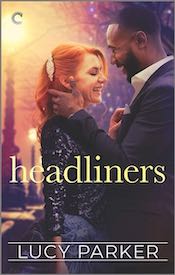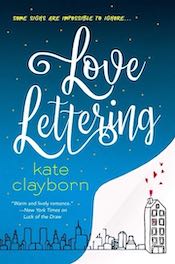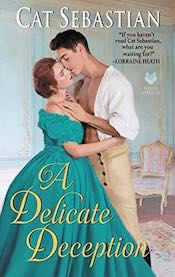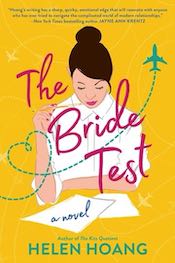Kissing Books: Time to start a brand new story
Every month, Olivia Waite pulls back the covers, revealing the very best in new, and classic, romance. We're extending a hand to you. Won't you take it? And if you're still not sated, there's always the archives.
You can’t edit a blank page.
This is common advice offered to writers, often credited to Jodi Picoult. It urges you not to give in to the fear of failure, and reminds you that producing something flawed but concrete is better than an unattainable, unshareable dream. Books that never get finished never get read.
There are also times, writers learn, when you have to let a story go. When no matter how much time and effort and sheer brain-wringing sweat you put in, the thing fails to do what it’s supposed to. Maybe the structure is flawed, or the characters infuriatingly inconsistent. You edit and you edit and you edit, you get expert feedback, you read craft manuals and brainstorm and add ten points to your blood pressure just trying to make tiny, incremental nudges of forward progress and yet somehow` despite all that labor the thing just does not want to work. It’s unavoidably, unfixably broken, and only the sunk cost fallacy keeps your nose pressed to the grindstone while other, better ideas beckon.
At such times the right thing is to let the story go and put the work into something else.
I come to bury the Romance Writers of America, not to praise them.
For those of you new to this topic, Twitter has been on fire about this since before Christmas. A timeline of the full series of events has been compiled and is being updated by author Claire Ryan. The details are jaw-dropping—like, secret shadow ethics committee nobody knew about and board members amended bylaws ex post facto so they retroactively had power for things they’d already done kind of jaw-dropping.
But the heart of it is this: RWA went to self-destructive lengths to discipline a woman of color for speaking out against the entrenched racism of its members. The original complaint was brutally, nakedly vindictive when it said that Courtney Milan “cannot be allowed to hold a position of authority, or to use her voice to urge others to follow her lead.” Because a Chinese American author dared to publicly criticize the portrayal of a Chinese heroine in a white author’s book. Over half the board has quit, including the president, numerous committee members have stepped down in protest, and the forums are bristling—half in righteous fury, half with smug pearl-clutchers newly emboldened to talk about ‘mob rule’ and ‘unprofessional conduct.’ Petitions (yes, plural) have gone out for the resignation of the remaining board, particularly the new president (formerly president-elect) and the executive director
I have never in my life seen this many romance authors this collectively furious.
Without a complete sweep of senior staff and the Board of Directors, and an extremely thorough independent audit of process and policy, it is impossible to imagine this organization carrying on except as a bastion of the most insidious kind of white supremacy. There is no safety within these walls.
The rage that sparked when all this broke did not rise up from nowhere. A great many people over the years have made a great many attempts to try and fix RWA’s very evident problems with racism, queerphobia, and other biases. Courtney Milan’s work in particular, both on the board and off, offered hope to a lot of us from various corners of the industry. It felt recently as though things were changing—as though the creaky old ship were finally starting to turn from its accustomed course. We had our first Black and Desi RITA winners not six months ago, after all.
But this fight is decades old. It was being fought in 2005, when RWA sent out a poll asking members if they ought to restrict their definition of “romance” to “one man, one woman”. The RWA President at the time wrote an email to Nora Roberts worried the lesbians would take over RWA. We were fighting it still in 2015, when an editor at an RWA conference flatly stated their romance imprint does not acquire Black or Latinx authors (they send those to race-specific imprints). We fought to bring self-published authors, erotic romance authors, digital authors, authors of color, disabled authors, and queer authors into the membership and leadership. We elected the most diverse Board of Directors in RWA history. We pointed out microaggressions and reported open aggressions, only to have those complaints be mysteriously buried or ignored and left to rot in someone’s inbox.
And every time we cried out that change is needed, that a lack of progress on this subject is a continuance of harm, the people in power tried to lullaby us with the refrain that if you want change, you have to be patient. Patient — while they ask for our time and labor, while they ask us to educate ignorance in spite of itself, and tolerate entrenched dismissal of our humanity. Patient — be civil, be quiet, sit down, don’t use your voice, don’t argue with us, with an unspoken but palpable or else we won’t do anything for you at all.
To judge the sacrifice we make in waiting, we have to ask: what is our time worth?
Romance has astonishingly high generational turnover. You can mark the passage of the years by the loss of institutions: were you there when Dorchester was failing, when Triskelion flamed out, when Ellora’s Cave filed that disastrous lawsuit, when we lost All Romance eBooks and Torquere and Borders and Samhain and Kimani and Less Than Three Press (who bowed out so graciously; I miss them). Amid months-long allegations of nonpayment of royalties, Dreamspinner Press recently put out an oh-so-reassuring announcement that they are absolutely not declaring bankruptcy, no way, no how. And that’s not even getting into the losses of individual people, as memories fade and familiar names are carved into the obituary pages (Judith Krantz and Johanna Lindsey just this year).
I feel like an elder sometimes, bending my face to the flickering light of Twitter’s endless dumpster fire and whispering: “Listen, children, as I tell you the tragedy of Janet Dailey...”
When readers and writers protest the lack of mainstream or scholarly attention to romance novels, we are not simply asking for our egos to be flattered. Libraries and newspapers come with archives more robust than the ephemeral ones of volunteer reviewers and critics. All love to the Browne Pop Culture Library, who are bravely tackling this mountain of work and whose Twitter feed is a delight. But often, trying to find out what happened five or ten or fifteen years ago means following the breadcrumbs of broken links, or being stonewalled by the lack of access to official RWA national or chapter records. We are constantly required to be the stewards of our own history — this on top of our creative work, and the day jobs that are necessary to pay the bills for so many working writers. It would be so nice not to have to fight for the same piece of ground over and over again.
Time, in such a climate, is triply precious.
Which is why it’s so pointedly appalling and frankly enraging to see RWA leadership ask for more of our time—and, not coincidentally, for more of our money—while we languish waiting for them to fix a problem of their own creation. As though we have no option but to capitulate. To bow the head and offer only gratitude for the crumbs they claim will feed us. They honestly think all they have to do is wait us out.
Fuck all of that.
We cannot let stewardship of the past prevent us from tending to our future.
To our glory, romance is fucking resilient. We have stamina. We outlast every rickety shell game they’ve tried to play on us. Bookstores wouldn’t stock category romances, so publishers set up their own mailing lists and turned to drugstores and grocery stores and built a readership. New York kept a lock on print publication, so fresh voices sent out digital books and revolutionized the industry virtually overnight. Amazon is becoming a hive of scum and villainy (both for wage workers and the creatives who fight for a piece of the limited Kindle Unlimited pie) so we’re reconnecting with independent bookstores. When institutions stop being useful, we build other ones—that’s how RWA started in the first place, so perhaps it’s fitting that’s how it ends.
It hurts to lose an organization we’ve sunk so much into over the decades. It hurts to leave and let the bigots think they’ve won, to have to rebuild support networks and infrastructure from scratch. It’s hard. Some of us separated from RWA years ago, others will be newly shocked. Either way, we should let ourselves mourn the loss.
And then we take a breath, and sit down with a fresh page, and start a brand-new story.
Recent Romances:

Mangoes and Mistletoe by Adriana Herrera (self-published: contemporary f/f):
This holiday novella is the lesbian Latina equivalent of the Great British Bake-Off. I honestly don’t know why I even need to tell you more than that. Get your sweet and sexy high-concept contemporary fix right here!
You would not believe the sheer number of mouth-watering food descriptions a talented author can fit into a novella-length work. I would like to eat every single thing described in these pages. And I would definitely like to read more romances with two women of color, who can both bond over a culture they share, and also talk about their different individual relationships with that culture. Sully and Kiskeya both grew up in the Dominican Republic—they also have a classic grump/sunbeam dynamic, and even the bad-idea sex (not in the practice kitchen, people cook there!) is hot as hell.
If you’ve heard the buzz about American Dreamer and wanted to try the author out, or if f/f is more your thing than m/m, here is the perfect bite-size morsel.
Rule number one: No distractions. “I don’t know if the Baking Challenge’s idea of building rapport is getting drunk with a bunch of fake elves.”
Why did her laugh make me think of flowers? Stupidly, I thought, she should always be wearing a crown of them on her head.

Headliners by Lucy Parker (Carina Press: contemporary m/f):
Very early buzz about this one made me sit down one rainy week and binge all Parker’s other books in anticipation—and I can’t remember the last time I got this sucked in to a contemporary romance series. Sharp dialogue, a close-up view of work—actual work!—in entertainment media, sizzling chemistry, gasp-worthy drama, and at the center of everything a great, warm, welcoming heart.
For the record, I’d definitely recommend reading The Austen Playbook before this one to get the full impact. It’s not going to be a hardship. Both are absolutely stunning.
Nick Davenport and Sabrina Carlton have dueling evening shows in London’s competitive entertainment world. They’ve carped and sniped at each other for years, even before Nick broke the story that devastated Sabrina’s family. It should have landed him the gig they were both competing for—except a hot-mic moment of candor about his new boss has Nick’s reputation as roughed up as Sabrina’s.
Naturally, to punish them both, new boss decrees they’ll be co-hosting Wake Me Up London, a cheery soft-pedaling morning show. Naturally, they’re livid.
Add in fallout from past drama, one horrifyingly creative saboteur, and a lightning-storm’s worth of sexual chemistry, and you’ve got an ideal enemies-to-lovers romp. There’s a fine line to be walked with this trope: too much bitterness, and the romance feels rickety; too little, and the reader grows impatient with the pace of the relationship. Parker’s brilliance is to build both Sabrina and Nick as gloriously, stubbornly professional: they’re exceptional at their job, and would never compromise their performance under any circumstances. It adds edge to their dynamic, as they try to out-best one another, but it also gives us a reason for them to trust one another when they realize someone’s playing silly buggers on the set. And then—oh, the falling mic! The Wibblet! The first time they [redacted]!
It’s enough glow to get you all the way through til spring.
“Are there times,” Sabrina asked, her voice just audible over the maintenance staffer’s hoovering, “when you take stock of where you are and what you’re doing, and wonder how the fuck this happened?” Daily. Never more so than now, as he crouched on the floor of the ugliest studio in the network, unshaven, in need of a shower and coffee, hiding in wait for a meddler whose Scooby-Doo antics were plausibly threatening what remained of his job security. He ought to be fed up to the back teeth, but right at this moment, he was very aware of the lightness in his chest.

Love Lettering by Kate Clayborn (Kensington: contemporary m/f):
Speaking of close-up views of work, here we have the latest entry in the fine romance tradition of Competence Porn. This love story of a lettering artist and a financial numbers analyst is one of the strongest contemporary romances I’ve seen this year.
Meg is supposed to be hand-lettering Reid Sutherland’s wedding program. She’s not supposed to be slipping in secret messages about how she thinks the match is doomed. And Reid’s definitely not supposed to pick up on those, call off the wedding, and one year later show up to ask Meg what the hell she’s up to. It’s an excruciatingly awkward beginning, which makes the richness of the emotional payoff all the more satisfying.
This is the first Kate Clayborn I’ve read. It won’t be the last—this book is utterly captivating, with a voice that leaps forward and then back on itself, like a series of curling loops inked a blank page. Dizzying, in the way of good champagne.
A new year is a blank page, too, and this story has so much to say about blank pages. Planners, agendas, weddings, fresh starts, new relationships, creative blocks, new upheavals in old relationships—what words and pictures and numbers we use to fill the spaces in our lives. To draw connections where once was nothing. Friendships, romances, family, the relationship with one’s own self. It’s a bit like New York, to which this book is very much a love letter: the epic shapes you see from faraway are full of secret details and revelations when you go look up close.
Highly recommended for anyone who has strong opinions about secret codes, typefaces, planners, or pens.
“Meg,” Reid says. “You remember Avery.”
I say nothing. I don’t even nod and smile. I am absolutely shocked; I feel as though I’ve walked into another dimension. In this particular dimension the hemline of your dress is wasted with city street dirt and you can’t remember when you washed your hair last and there’s a high-calorie dessert called a Salty Pimp running down your left hand when you run into—in a city of almost two million people!—the ex-fiancée of the man you’re currently sleeping with.
This dimension is called Absolute Bullshit.

A Delicate Deception by Cat Sebastian (Avon Impulse: historical bi m/bi f):
High on my list of resolutions for 2020 is: read (and write?) more queer m/f romances, both cis and trans and butch and femme and everything around and in between. Bang the drum about people falling in love with people, no matter what gender each one happens to be. Always and forever more bi and pan and queer characters who don’t treat individual human sexual self-discovery like an automatic either/or, in or out, gold-star purity test.
This book stars two anxious, clever, guarded, prickly-but-tender people trying to figure out how to people both separately and together. Amelia Allenby has fled the London social scene lest it literally drive her mad — she has a particular form of anxiety that feels specific and weighty and vivid, and means she spends a great deal of time outdoors. On her walks she begins encountering Sydney Goddard, a railway engineer and builder, whose anxieties take a different form than hers, and whose skills are about finding solutions and overcoming obstacles in the landscape. They’re both grieving, they’re both more than a little self-loathing, and their romance is tender enough to break anyone’s heart.
This book is full of woods and paths and cottages and half-ruined houses being restored. There are multiple adorable dogs, and a snarky ostler, and a child who I read as a light fuck you to the young Adèle from Jane Eyre. It’s a bit wild, just the right amount rambling, and entirely charming. If you’ve read the prior A Duke in Disguise you’ll not only recognize a few characters, but start to see how deeply entwined that earlier book was with London, with the urban streets and houses and shops and people. This is that story’s country cousin: it reads like a breath of fresh spring air.
“Did you hear that there’s a duke living at Pelham Hall?” she asked, striving to make light conversation.
“I don’t want to talk about dukes.” His voice was low, almost a growl. “Bollocks on every last one of them.”
“Are you a radical? What a relief. One doesn’t like to ask, but what if I had kissed a Tory?”
This Month’s Immigrant Romance With None of Your Xenophobic Bullshit

: The Bride Test by Helen Hoang (Penguin Books: contemporary m/f):
In 1811 the Great Comet blazed across the sky, and people considered it a portent. That year’s champagne vintage was particularly splendid, and the wines resulting came to be called comet vintages: the term implies beauty coming from fear and disaster, something rich and special and unique emerging from a time of turmoil and alarm.
It strikes me that the past year’s romances have been very much like this. It is quite likely we’re living through a Golden Age of romance — though Golden Ages have a way of being identified in hindsight, usually. But after the 2016-2017 years, where it seemed every writer I knew had staggered beneath the neverending blows of events, there has been a sudden, fierce flowering of truly incredible stories, where the hope of the HEA is not nebulous and dreamy, but vital and pulsing and urgent.
Better writers than I have discussed the difference between an ex-pat and an immigrant. We’ve see a lot of ex-pats in romance — Greek tycoons and social-climbing Americans hunting for titled spouses, all those fictional royals — but suddenly major entries in the genre are putting immigrants at center stage. Rebekah Weatherspoon’s Xeni, for example, had a working-class Scotsman living in California, worried about paying off student loans. And the latest from Helen Hoang, whose The Kiss Quotient was one of the runaway illustrated-cover hits of the past few years, gives us Mỹ, a Vietnamese woman working as a hotel maid, who agrees to an arranged marriage because it will get her to America to build a better life for herself and her daughter. Her fiancé is Khải, a man whose good looks and financial success hides the deep-seated struggles he faces with as a man on the autism spectrum. They both have old wounds, as romance protagonists do, and things go very, very wrong before they ultimately go right.
This is not a story abut the superiority of the American system. This is a story about American families, new and old, helping one another despite the American system. It is beautiful and absolutely wrenching at times; it is also funny and warm and has some of the best sexual tension you’ll see. Kick-me-in-the-stomach kind of yearning. If you only read one romance this year — though I certainly recommend reading more — this would be an excellent choice.
“Ah, so Mỹ approves. I told you he was handsome,” Cô Nga said with a knowing smile.
Mỹ blinked like she was coming out of a trance and handed the picture back to the lady. “Yes, he is.” He’d make a lucky girl even luckier someday, and they’d live a long, lucky life together. She hoped they experienced food poisoning at least once. Nothing life-threatening, of course. Just inconvenient—make that very inconvenient. And mildly painful. Embarrassing, too.